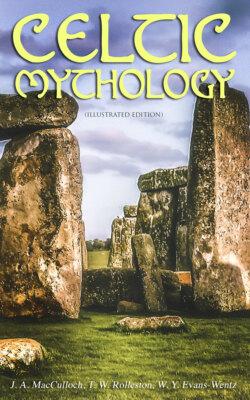Читать книгу CELTIC MYTHOLOGY (Illustrated Edition) - T. W. Rolleston - Страница 24
На сайте Литреса книга снята с продажи.
The Cursing of Tara
ОглавлениеA singular and very cogent illustration of this truth can be drawn from the history of the early Celtic world. In the sixth century A.D., a little over a hundred years after the preaching of Christianity by St. Patrick, a king named Dermot MacKerval22 ruled in Ireland. He was the Ard Righ, or High King, of that country, whose seat of government was at Tara, in Meath, and whose office, with its nominal and legal superiority to the five provincial kings, represented the impulse which was moving the Irish people towards a true national unity. The first condition of such a unity was evidently the establishment of an effective central authority. Such an authority, as we have said, the High King, in theory, represented. Now it happened that one of his officers was murdered in the discharge of his duty by a chief named Hugh Guairy. Guairy was the brother of a bishop who was related by fosterage to St. Ruadan of Lorrha, and when King Dermot sent to arrest the murderer these clergy found him a hiding-place. Dermot, however, caused a search to be made, haled him forth from under the roof of St. Ruadan, and brought him to Tara for trial. Immediately the ecclesiastics of Ireland made common cause against the lay ruler who had dared to execute justice on a criminal under clerical protection. They assembled at Tara, fasted against the king,23 and laid their solemn malediction upon him and the seat of his government. Then the chronicler tells us that Dermot's wife had a prophetic dream:
“Upon Tara's green was a vast and wide-foliaged tree, and eleven slaves hewing at it; but every chip that they knocked from it would return into its place again and there adhere instantly, till at last there came one man that dealt the tree but a stroke, and with that single cut laid it low.”24
The fair tree was the Irish monarchy, the twelve hewers were the twelve Saints or Apostles of Ireland, and the one who laid it low was St. Ruadan. The plea of the king for his country, whose fate he saw to be hanging in the balance, is recorded with moving force and insight by the Irish chronicler:25
“ ‘Alas,’ he said, ‘for the iniquitous contest that ye have waged against me; seeing that it is Ireland's good that I pursue, and to preserve her discipline and royal right; but 'tis Ireland's unpeace and murderousness that ye endeavour after.’ ”
But Ruadan said, “Desolate be Tara for ever and ever”; and the popular awe of the ecclesiastical malediction prevailed. The criminal was surrendered, Tara was abandoned, and, except for a brief space when a strong usurper, Brian Boru, fought his way to power, Ireland knew no effective secular government till it was imposed upon her by a conqueror. The last words of the historical tract from which we quote are Dermot's cry of despair:
“Woe to him that with the clergy of the churches battle joins.”
This remarkable incident has been described at some length because it is typical of a factor whose profound influence in moulding the history of the Celtic peoples we can trace through a succession of critical events from the time of Julius Caesar to the present day. How and whence it arose we shall consider later; here it is enough to call attention to it. It is a factor which forbade the national development of the Celts, in the sense in which we can speak of that of the classical or the Teutonic peoples.
